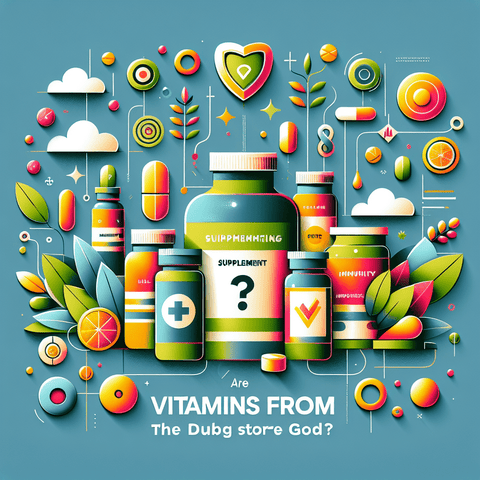Introduction: Understanding the Role of Vitamins in Nutritional Supplements
The global use of vitamins and dietary supplements has skyrocketed in recent years, fueled by a growing awareness of personal health, nutrition, and preventive care. One look at any supermarket or pharmacy shelf and you'll find dozens, if not hundreds, of colorful bottles claiming to boost immunity, support bone health, increase energy levels, and improve overall well-being. It’s no surprise that over-the-counter (OTC) vitamins have become a staple in many households. Consumers are increasingly turning to retail chains, grocery stores, and online marketplaces to purchase their supplements—mainly for convenience and the appeal of affordability. The digital era has also made it easy to find products at the click of a button, often accompanied by user reviews and glowing testimonials. However, the ease of accessibility has sparked one essential question for many: Are vitamins from the drugstore any good? This blog post aims to unpack the truth about store-bought vitamins. We'll delve into what makes a vitamin effective, explore their safety profiles, understand regulatory differences, and identify how to select a high-quality supplement amid a saturated market. More importantly, we’ll help you distinguish whether your multivitamin is a nutritional ally or an overhyped placebo.Vitamins in Nutritional Supplements: What Are They and Why Do We Take Them?
Vitamins are organic compounds essential for the proper functioning of the body. Since the human body either does not produce them or produces only minimal amounts, most vitamins must be obtained from food or supplements. In nutritional supplements, the most common types include vitamin A, B-complex (B1, B2, B3, B5, B6, B7, B9, and B12), C, D, E, and K. Each plays a distinct and crucial role in supporting our physiological systems. Vitamin A is necessary for eye and skin health, while the B vitamins are involved in metabolism, energy production, and nervous system support. Vitamin C functions as a potent antioxidant and supports immune responses. Vitamin D, synthesized from sun exposure, contributes to bone and muscle health and bolsters the immune system. Vitamin E protects cells from oxidative stress, and vitamin K is critical for blood clotting and bone metabolism. You can explore more on the [benefits of vitamin D](https://www.topvitamine.com/collections/vitamin-d-benefits-sources-safety) and [functions of vitamin K](https://www.topvitamine.com/collections/vitamin-k-benefits-bone-blood-health) through curated resources. Although obtaining vitamins from whole foods is ideal, modern lifestyles don't always support optimal nutrition. Processed foods, stress, environmental toxins, and dietary restrictions can hinder vitamin absorption or availability, creating a gap that supplements are designed to fill. For example, vegetarians may require additional B12, and people with limited sun exposure may need supplemental vitamin D. However, synthetic vitamins in supplements differ from those found in whole foods. Food-based vitamins come with cofactors and phytonutrients that enhance bioavailability, while isolated forms in pills may lack these synergistic elements. That doesn’t mean supplements are ineffective—it means their utility depends on their formulation, absorption rate (bioavailability), and the individual’s unique nutritional needs. It's crucial to prioritize high-quality vitamins that are biologically active, properly dosed, and tested for contaminants. When chosen wisely, supplements can complement one’s diet and significantly contribute to overall health maintenance.Supplements and Over-the-Counter Vitamins: Are They Equally Effective?
One of the significant debates around store-bought supplements is their effectiveness. Most over-the-counter (OTC) vitamins are classified as dietary supplements, which places them in a category distinct from prescription medications. Unlike drugs, dietary supplements in the European Union and many other regions are not tightly regulated for efficacy before hitting the market. This lack of stringent pre-approval testing can result in disparities in quality, potency, and bioavailability. For instance, two brands might sell a vitamin D supplement, but only one may use cholecalciferol (D3), the more bioavailable form. Worse, some may contain misleading labels, where the actual nutrient content differs from what is advertised. That said, reputable OTC vitamins can be just as effective as higher-end or prescription versions—as long as they meet appropriate standards. Some manufacturers voluntarily adhere to Good Manufacturing Practices (GMPs), obtain third-party certifications such as USP (U.S. Pharmacopeia) Verified or NSF International, and undergo rigorous testing to prove purity and potency. It's also essential to understand how to read supplement labels. Look for the type of vitamin used (e.g., methylcobalamin vs. cyanocobalamin for B12), dosage, and the presence of additives, allergens, or unnecessary fillers. Watch for warnings and tolerable upper intake levels, especially with fat-soluble vitamins like A, D, E, and K, which accumulate in body fat and can cause toxicity if overused. Consumers need to see through marketing terminology, too. Buzzwords like “natural” or “clinically proven” do not equate to quality without scientific substantiation. Third-party seals and transparent ingredient sourcing can offer better assurance of quality and effectiveness.Retail Vitamins: Convenience or Compromise?
Retail chains and online platforms have democratized access to vitamins. Grocery stores, drugstores, and online retailers like topvitamine.com offer thousands of supplement choices—from classic multivitamins to trending compounds like omega-3s, magnesium, and herbal adaptogens. For most people, the appeal lies in affordability, variety, and the convenience of shopping nearby or online. However, the widespread availability of supplements does pose some challenges. Not all retail vitamins are created equally. The manufacturing process, ingredient sourcing, and storage conditions all influence product stability and effectiveness. For instance, high temperatures or prolonged shelf exposure can degrade nutrients like vitamin C. The risk of counterfeit products is another concern, especially from unauthorized online sellers. Unlike reputable platforms such as [Topvitamine.com](https://www.topvitamine.com/collections/vitamin-c-benefits-immunity-antioxidant-energy), some marketplaces may lack proper quality oversight. Consumers might unintentionally purchase products with harmful contaminants or completely ineffective formulations. Also, mass-market formulas often prioritize cost-efficiency over therapeutic value. You may find supplements containing less absorbable forms of nutrients (e.g., magnesium oxide instead of magnesium citrate or bisglycinate) due to lower production costs. You can compare options through curated high-quality [magnesium supplements here](https://www.topvitamine.com/collections/magnesium-benefits-energy-muscle-bone-support). That said, it’s not all compromise. Many reputable vitamin brands strategically partner with retailers or sell their products through dedicated supplement platforms known for transparency and quality assurance. By leveraging price filters, reading verified customer reviews, and checking certifications, health-conscious consumers can make informed selections without sacrificing quality.Store-Bought Supplements: Are They Reliable and Worth It?
Whether you’re looking for a general multivitamin, immune support, or targeted formulas like omega-3s and bone health supplements, store-bought products offer a broad selection. But reliability comes down to more than just the brand name or packaging—it hinges on manufacturing discipline, scientific formulation, and consistent quality control. A reliable vitamin supplement undergoes third-party testing to verify label accuracy, purity (free from heavy metals, pesticides, and contaminants), and potency. Certifications from groups such as the USP, NSF, or Informed-Choice provide added assurance that a product meets these rigorous standards. Multivitamins are among the most popular types sold — often marketed for men, women, children, and seniors — but efficacy varies widely. Some generic versions have poorly absorbed forms of minerals, such as zinc oxide or ferrous sulfate, rather than their chelated or amino acid-bound counterparts. Price is another polarizing factor. Expensive doesn’t always equate to better. High-quality vitamins based on clinical research and manufactured to top standards can be found at competitive prices. At the same time, ultra-cheap products may cut corners. It’s wise to balance cost and quality by evaluating per-serving value, ingredient sourcing, and consumer feedback. Online platforms like [Topvitamine.com](https://www.topvitamine.com/collections/dha-epa-omega-3-supplements) offer curated assortments with a balance of both. Consumer reviews provide valuable insights about a product’s effectiveness, palatability (especially for chewables or liquids), and observed benefits over time. However, since individual responses vary and placebo effects are real, anecdotal evidence should complement—rather than substitute—clinical data and professional guidance. Ultimately, store-bought supplements can be effective and reliable when sourced conscientiously. The key is buying from reputable sources and verifying product quality before adding them to your routine.Vitamin Quality: What Should Consumers Look For When Choosing Store-Bought Vitamins?
Navigating the supplement aisle can be overwhelming, especially if you don't know what to look for. Key quality indicators include purity (free from contaminants and unnecessary additives), potency (meeting the promised dosage levels), and bioavailability (how well your body absorbs and uses the nutrients). Another vital factor is transparency. Trustworthy brands will disclose full ingredient lists, including any fillers, binders, or potential allergens. Avoid products with vague labels like "proprietary blends" that obscure ingredient amounts. Certifications can significantly streamline the decision-making process. The USP Verified mark, NSF certification, certifications for Non-GMO compliance, and organic sourcing provide third-party validation that a product meets stringent quality standards. These seals are invaluable when faced with a sea of store shelf options. Risks of taking low-quality supplements range from ineffective results to adverse effects. Poor manufacturing processes can lead to contamination with heavy metals, microorganisms, or allergens. Inadequate dosing may mean you’re not getting enough of the vitamin, while overdosing—especially of fat-soluble vitamins—can lead to toxicity if taken long term without appropriate guidance. Reading the label also means understanding serving size and daily value percentages. Some supplements list nutrients in forms with low utilization by the body (e.g., folic acid vs. methylfolate), so it’s essential to verify whether the vitamin is in an active, bioavailable form. Often overlooked is the delivery method. Capsules, tablets, powders, and liquids each have implications for absorption. Liposomal forms or time-release tablets might offer enhanced efficacy, depending on the nutrient. Choosing from specialized assortments such as [immune-focused vitamin C supplements](https://www.topvitamine.com/collections/vitamin-c-benefits-immunity-antioxidant-energy) and [high-quality vitamin K options](https://www.topvitamine.com/collections/vitamin-k-benefits-bone-blood-health) can simplify your search for excellence.Are Store-Bought Vitamins Good? A Balanced Perspective
The idea that all drugstore vitamins are either a miracle or a scam is an oversimplification. A balanced perspective recognizes that the supplement industry spans a wide quality spectrum. While some store-bought vitamins offer low value and questionable ingredients, others adhere to the highest standards in production, formulation, and efficacy. The benefits of reputable store-bought vitamins are numerous: affordability, convenience, and the ability to customize supplementation based on age, sex, lifestyle, and dietary habits. Furthermore, when obtained from vetted stores or reputable websites, these products can contribute meaningfully to your health. There are, however, limitations. No supplement can replace a balanced diet, eliminate the need for physical activity, or entirely prevent chronic illnesses. And basing supplementation solely on advice from influencers or trends—rather than need and science—can do more harm than good. That's why healthcare guidance matters. Before starting new supplements, especially high-dose formulations or those targeting specific conditions, a discussion with a knowledgeable clinician ensures both safety and relevance. Blood tests can reveal micronutrient deficiencies, and a registered dietitian or doctor can interpret your health profile to recommend appropriate interventions. A sound strategy includes choosing quality-assured products, reading labels, integrating supplements thoughtfully into a healthy lifestyle, and periodically reassessing their need and effectiveness.Conclusion: Making Informed Choices About Vitamins from the Drugstore
In today’s wellness-driven society, nutritional supplements can serve as powerful allies when chosen wisely. While not all store-bought vitamins are flawless, many offer excellent options—so long as consumers apply diligence and discernment. Evaluating supplement quality involves examining bioavailability, purity, dosage accuracy, and third-party certifications. Distinguishing marketing from science, reading ingredient labels, and purchasing from reputable sources—such as specialized platforms like [Topvitamine.com](https://www.topvitamine.com)—are all part of the informed buyer’s toolkit. Equally important is consulting healthcare professionals to tailor supplement use to your specific health needs, ensuring compatibility with medications and minimizing risks. Supplementation works best when synergized with consistent nutrition, exercise, stress management, and sufficient rest. By prioritizing education and mindfulness, you can turn your vitamin purchases into valuable investments in long-term health and vitality.Q&A Section
Q1: Are drugstore vitamins safe to consume?Yes, most vitamins from reputable drugstores are safe, particularly if manufactured in compliance with regulatory standards and verified by third-party testing organizations. Q2: Do inexpensive vitamins work as well as premium brands?
Sometimes. Price doesn't always reflect quality. Some affordable brands meet high manufacturing standards, while others may cut corners. Always check ingredient forms, certifications, and reviews. Q3: How do I know a supplement is high quality?
Look for third-party certifications (e.g., USP Verified), ingredient transparency, active ingredient forms, and products sold by reputable platforms like Topvitamine.com. Q4: Can I take multiple vitamins at once?
Multivitamins are formulated for daily use, but combining multiple single-nutrient supplements should be done with caution. Consult a healthcare provider to avoid overdosing or interactions. Q5: Are food-sourced vitamins better than synthetic ones?
Food-sourced vitamins may offer better bioavailability due to accompanying cofactors, but well-formulated synthetic supplements can also be effective and are often more standardized in dosage.



